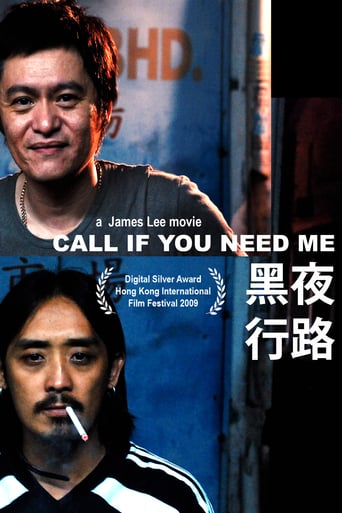DICK STEEL
It's an open secret that James Lee gets a lot of love from the Singapore International Film Festival, having almost all, if not all I believe, of his works screened at past editions. Last year we had a rare glimpse of a commercial horror project, Hysteria, and this year Lee goes back to his festival art house roots with Call Me If You Can, a gangster based film tackling the usual themes of Brotherhood and Loyalty that are staple of Hong Kong crime dramas, but without much blazing shootout action.It's an atmospheric family piece if you will, where blood runs thicker than water in episodes that we'll see unfold in Or Kia (played by Singapore's indie hero Sunny Pang) leaving his village for the big city of Kuala Lumpur, where he looks up his cousin Ah Soon (played by Malaysian musician Pete Teo) who runs a local racket of profit sharing from debt collecting from the bigger fish. In fact, what seemed like a family gathering of relatives soon pave way toward something more sinister, where underlings form part of the family table, and cocktail drugs get passed around as recreational dessert.Watching the first act, I can't help but to think of Tarantino's Vincent Vega and Jules Winnfield talking about Royale with Cheese and foot massages whilst on their way to a hit job. Here, Lee has his characters talking like your everyday Joe with everyday worries, hopes and their hobbies, bitching about how comic book creators sell out by prolonging their material through the stuffing their stories with incredible characters. Or characters breaking out into talking about boxing, or even football betting odds. Curiously enough, Lee also put in a lot of hungry people in the film, probably as a metaphor that they're craving something in life, but are not going to get it as easy as a 2-minute instant noodle, or to buy it off the streets from hawkers.Between the 2 acts, I very much prefer the first half to the second, because the second departed from the warm and cozy environment that the cousins are used to, and propel them forward given that their racket together had yielded results, and results meant promotions. Since it's family, Ah Soon hands over his operations to Or Kia, and we see a development of their characters for the worst, and not having both on screen together meant some of the fun dissipating, especially when Ah Soon starts to mope, brood and become exasperated because of his missing wife. And like all gangster movies, personal and business doesn't mix, and a handful of characters had made the business component very clear.It's nice to see how James Lee tackles the issues of corruption in the city indirectly. One scene I thought which was brilliant, was how he confirms a cafe meeting with a high-ranking police officer and the hoodlums. The bribery taking place is not so subtle, yet enough to bring out awareness that the man hiding behind the shades was an officer of the law, through an implied remark of a game found in an iPhone. Folks arrested are also easily let off the hook through the usage of an underaged fall guy, with the corrupt contacts fully condoning such practice. I guess there would be some reference of such practices that Lee would probably be aware of, to have incorporated this in the film.Those looking for a violent, action-packed movie need be reminded that this is a James Lee movie. Guns are brandied around, but rarely used. Instead, the characters rely heavily on a lot of swearing in a myriad of languages, and plenty of cigarette smoke to get their points across. Violence happens off screen, so you don't get to see much. But that's not what you should be looking out for in the movie. The key component that worked is the excellent chemistry that Sunny Pang and Pete Teo share in the movie, as cousins who are more like brothers, and lighting up the screen each time they share the same frame. There is word that James will be working with Sunny again, this time in a commercial action film, and I secretly wish that Pang and Teo could be reunited again for the big screen.

